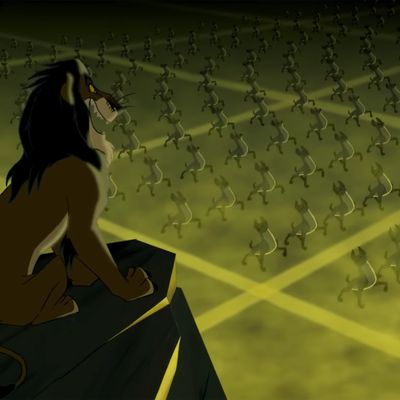
It’s easy to convince yourself the past was a simpler, more innocent time. In 2017, 41 percent of Americans said they thought life in the U.S. was worse than it had been a half-century before — and that was 1967, when it was still legal to refuse to sell your house to a black person, and when 11,000 Americans died in Vietnam. Whenever I find myself falling prey to similar nostalgia, I try to remember one thing: 25 years ago, Disney released an animated movie about African wildlife with imagery inspired by Nazi propaganda. Manichean notions of “better” or “worse” simply do not apply.
In case you’ve forgotten, the scene in question pops up midway through The Lion King’s first act, as Scar, the film’s effeminate villain, sings his big “I Want” song, “Be Prepared.” At first, Scar merely struts through his lair like it’s a straight man’s Atlanta home, but as he details his plans to assassinate his brother and claim the throne for himself, the filmmakers raise the stakes. In shots borrowed from Leni Riefenstahl’s Triumph of the Will, Scar stages his own version of the Nuremberg rally: Perched high on a rock, he observes his hyena army as they march past him in the unmistakable straight-legged gait of German stormtroopers. When Scar tells the hyenas, “Stick with me, and you’ll never be hungry again,” he’s backlit by soaring columns that recall Albert Speer’s Cathedral of Light. The message is clear: Scar is not just gay, he is also Hitler.
(If you need a refresher, the Nazi stuff starts around two minutes into the video below.)
In 1994, there was not quite the media infrastructure around to make the goose-stepping hyenas a Thing — no Twitter for mini-Sontags to make threads about Fascist aesthetics, no Instagram for fans to create Nazi-hyena memes, no blogs to compare Scar’s sales pitch to the hyenas with the Nazi concept of Lebensraum. But despite the “not many people know this” tone of subsequent media coverage, this was definitely something viewers picked up on at the time. It helped that Riefenstahl was back in the Zeitgeist: She’d recently released her memoirs, and an acclaimed documentary about her life was airing on PBS. Critics like the Washington Post’s Hal Hinson mentioned the Nazi imagery as part of the general fear that the film might be too dark for children. (Probably, but that’s what gave it such power.) Others, like Perri Klass in the New York Times, considered it just another highbrow cultural reference that entertained parents while the kids were occupied by the silly warthog.
Though the postwar era was filled with debates about whether or not it was appropriate to use Fascist imagery in film, the goose-stepping hyenas did not appear to kick up much of a fuss. Which is not to say that the ’90s were a simpler time where people didn’t get into arguments about the politics of children’s cartoons, because people absolutely did get into fights about other aspects of The Lion King. Besides the previously mentioned violence and gay undertones, the Boston Globe published an op-ed criticizing the hyenas for perpetuating ugly racial stereotypes, while syndicated columnist Neil Chethick called The Lion King “a fundamentally sexist film,” since, unlike real lions, the movie’s females just sat around and waited for Simba to save them. (The new Lion King’s plot has been updated to give them more agency.) This backlash, of course, inspired a counter-backlash, with the Associated Press and the Chicago Tribune using the controversy to argue that political correctness was out of control. This was only a few months before the 1994 midterms, when Republicans would stoke fears of liberal overreach and regain full control of Congress for the first time in decades. It was all very 2019, which is to say, maybe even 2019 isn’t as 2019 as it looks right now.
Despite early reports to the contrary, the new Lion King does include a version of “Be Prepared,” but it’s more spoken than sung, and there are absolutely no goose-stepping hyenas in evidence. (Instead, like every character in this movie seems to do, Scar just kinda walks around.) I’m not trying to make you shed a tear for Fascist feliforms, but their absence points at one key way we have changed. Over the past 25 years, as Disney has become synonymous with a kind of anodyne corporate progressiveness, can you ever imagine the studio making that kind of risky creative decision again?


